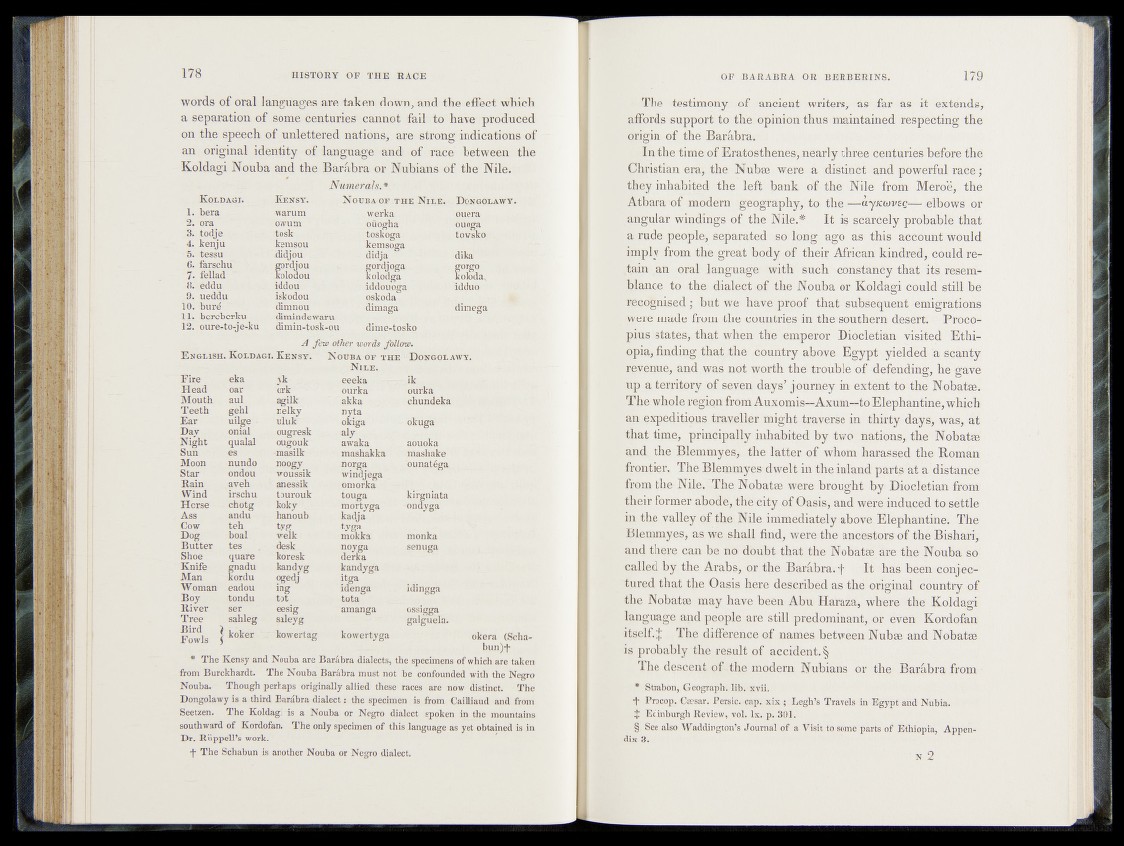
words of oral languages are taken down, and the effect which
a separation of some centuries cannot fad to have produced
on the speech of unlettered nations, are strong indications of
an original identity of language and of race between the
Koldagi Nouba and the Barhbra or Nubians of the Nile.
Numerals. *
Koldasi. Kensy. N ohba of .the Nile. Dongolawy.
1. bera warum werka ouera
2. ora uwum ouogha ouoga
3. todje tosk toskoga towsko
4. kenju kemsou kemsoga
5. tessu didjou - didja dika
6. farschu gordjou - gordjoga gorgo
7 . fellad ‘ kolodou kolodga koloda.
8. eddu iddou iddouoga idduo
,9. ueddu iskodou oskoda
10. burd dimnou dimaga dimega
11. bereberku dimindewaru
12.- oiire-to-je-ku dimin-tosk-ou dime-tosko
A few other words fallow.
E n g l is h . K o l d a g i. K e n s y . N ou ba o f t h e 11 D on g o l aw y .
N i l e .
E k e
Head
Mouth
Teeth
Ear
Day
Night
Sun
Moon
Star
Rain
Wind
Horse
Ass
Cow
Dog
Butter
Shoe
Knife
Man
Woman
Boy
River
Tree
Bird
Eowls
eka yk eeeka - i t
oar ork ourka ourka
aul agilk akka chundeka
gehl nelky nyta
uiige • uluk okiga okuga
onial ougresk aly
qualal ougouk awaka aouoka
es masilk mash akka mashake
nundo noogy norga ounatéga
ondou woussik winajèga
aveh anessik om orka
irschu tourouk touga kirgniata
ctaotg koky mortyga ondyga
andu hanoub kadja
teh ^ tyg tyga
boal welk mokka monka
tes desk. noyga senuga
quare koresk derka
gnadu kandvg kandyga
kordu ogedj itga
eadou mg idenga idingga
tondu tot tota
set eesig amanga ossigga
sahleg saleyg galguela.
koker r kowertag kowertyga okera (Scha*
bun).t
* The Kensy and Nouba are Bardbra dialects, the specimens of which are taken
from Burckhardt. The Nouba Barabra must not be confounded with the Negro
Nouba. Though perhaps originally allied these races are now distinct. The
Dongolawy is a third Bardbra dialect s the specimen is from Cailliaud and from
Seetzen. The Koldagi is a Nouba or Negro dialect spoken in the mountains
southward of Kordofan. The only specimen of this language as yet obtained is in
Dr. Riippell’s work.
■f The Schabun is another Nouba or Negro dialect.
The testimony of ancient writers, as far as - it extends,
affords support teethe, opinion thus; maintained respecting the
origin ©£ the Barabra;-*,
In the time-pf Eratd^thenes^jearly three centuries b^fete the
Christian era, the Nubee were a ;didti®fet and powerful raee|
they inhabited the fffdn Mere®, the
Atbara of modern ‘geograph^\4d-th&— elbows or
|apgular windings of th^ ^ ^ p li It is s te e ly probable that
a rude people, separated so l^gVagoj as t^s^ account would
imply from the great body of theiy African kindr.ed^ eduld re-f
Aain an oral .language* with jfeach ''constancy tjiat' Its ’ reMerrf-
^lance to the d ia le c ts the Nouba or Koldag&rajj&ld still be
|‘^c€^nised ; but we have proof that • gdb^e^uent^Cmiglpibns
pjjverei jtn^dp from the countries in the southern t|#Ttyocopius
states, that when the emperor Diocletian visited -Ethiopia,
finding that the country above Egypt yiq|ded aj^Hty
;revenue, and,was not worth the trouble^defending, he-gave
up a territory of seven days’ journey in extent-to the Nobajfce^
The whole region from A uxomis—Axum—to Elephantine, which
an expeditious traveller might traverse in thirty-days, was, at
that time, principally inhabited by two nations,-the^Nbbat^
and„ the Blemmyes, the latter of whom harassed the Roman
frontier. The Blemmyes'dwelt in the inland parts at a dlstiante-
from the- Nile.~The„. Nobatse were brought by Diqiflfetian from
their former abode, the city of Oasis, and were induced-to settle-
in the valley of the Nile immediately above Elephantine. The
Blemmyes, as we shall find, were the ancestors of the Bishari,
and there can be no doubt that the Nobatae are the Nouba soj
called by the Arabs, or the Barabrarj- Jr It has been conjectured
that the Oasis here described as the original d'ppntiy of
the Nobatse may have been Abu Haraza, where the Koldagi
language and people are still predominant, or even Kordofan;
itself. J The difference of names between Nuhae and Nobatae
is probably the result of accident. §
The descent of-the modern Nubians or the Barhbra from •
* Strabon, Geograph. lib. Nvii.
t Procop, Csesar. Persic, cap. x ix ; Legh’s Travels in Egypt and Nubia.
$ Edinburgh Review, vol. lx. p. 301.
§ See also Waddington’s Journal of a Visit to some parts of Ethiopia, Appendix
3.
2